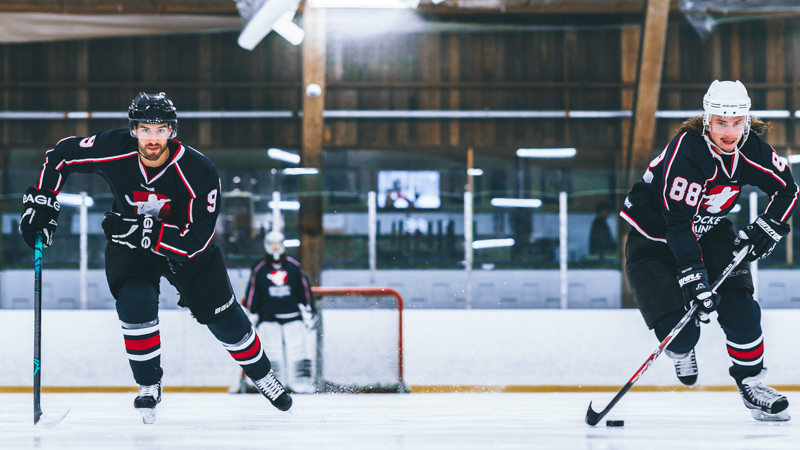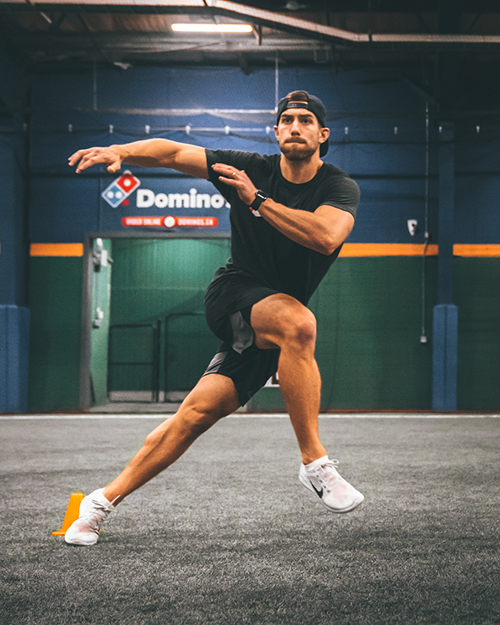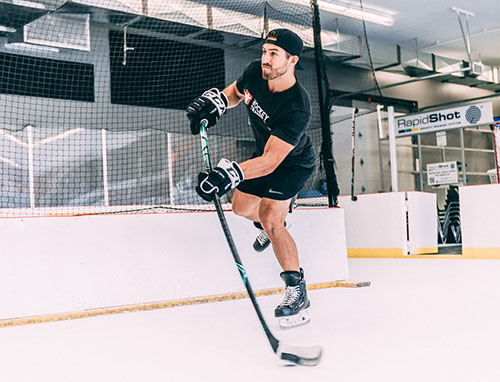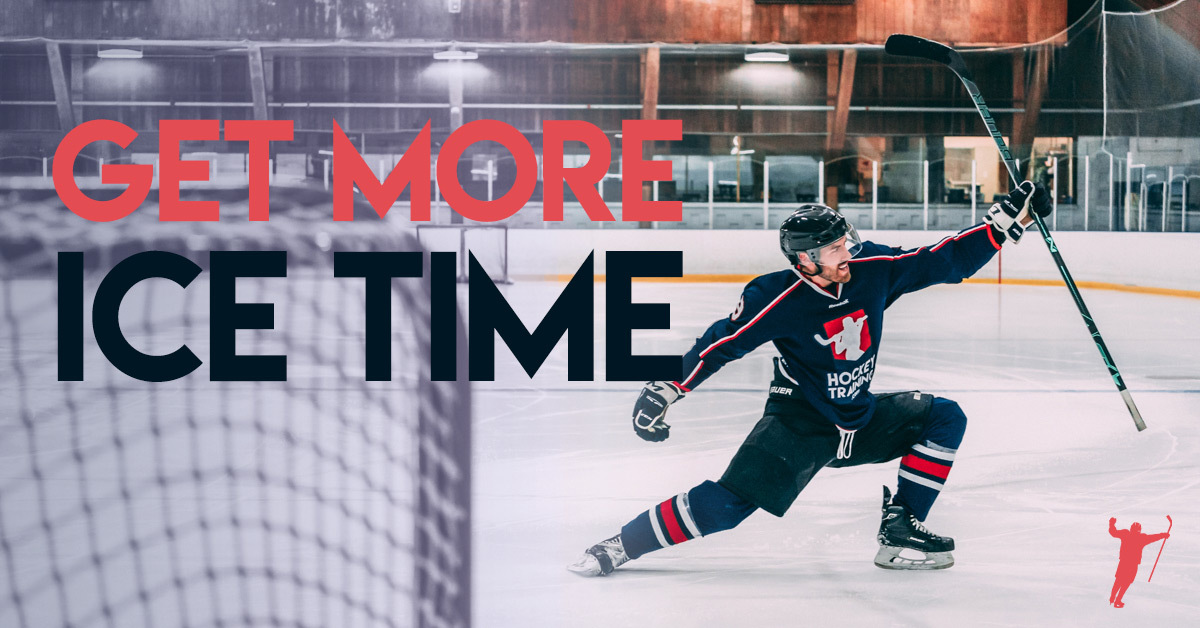A question that frequently springs up in a hockey player’s mind is “How can I get more playing time?” Parents also want their kids to get more time on the ice, and most of them can create a real argument as to why their kid deserves it.
Coaches understand that it’s tough being the player who only gets a few minutes each game. For many players, hockey is a favorite pastime: they play some form of it during school breaks, after school, before school—anytime they get a chance. So when you’re deprived of “showing them what you’ve got” because you’re riding the bench, it can be heartbreaking.
There are limited minutes to divide up during a game, and some hockey teams are so large that a player can ride the bench the entire game and it won’t impact the team’s shifts in any way.
This makes life tough on the kid, tough on the parents, and tough on the coach. And there’s no easy fix, which results in players having to compete amongst their teammates for ice time.
In this article, I’m going to share with you 10 different tips you can use to increase the amount of ice time you receive each game. If you follow these honestly and consistently, you will put yourself in the best possible position to get more ice time than ever this year.
#1: Don’t Complain
Let’s get this one out of the way first: excuses, whining, and complaining aren’t going to get you more ice time—even if it’s all justified.
Your coach and your teammates won’t be on board with it, so instead of whining about what you think is fair, start focusing on things that are within your control. These things include your attitude, your hockey training program, how much at-home skill work you do every day, your hockey-specific nutrition, how much game study you do, etc.
Focus on what makes you better; trust me when I tell you that whining and complaining have never gotten anybody anywhere in hockey.
#2: Be Patient
I want to make this very clear: earning playing time isn’t something that is going to happen overnight.
Even if you implement all 10 tips in today’s article, you can’t expect to get 20 more minutes of ice time in your next game. These things take time. You need to keep working hard, working smart, and focusing on the things you can control rather than the things you can’t.
If you follow these tips and you keep a positive attitude, your time will come.
#3: Put the Team before Yourself
Even though I want you to get more ice time, the most efficient way to do this is by always doing what’s best for the team.
The team is always the number one priority.
It’s amazing what you can accomplish when you’re not worried about who gets the credit.
Even when you feel like you’re unfairly stuck on the bench, you should be cheering loudly for your teammates during the game. Be the first to rush over and help a teammate after they’ve been checked. If it’s a 2-on-1 and your teammate has a better chance of scoring, don’t be a hero and try to take the shot yourself.
Make your teammates better.
The player who is more worried about their individual stats than the success of the team will never get the ice time they feel is justified for them.
#4: Know Your Game

Your coach and your fellow teammates love it when you have the self-awareness to know your strengths and weaknesses and adjust your game accordingly for it.
If you’ve never been an offensive-minded D-man, halfway through the 3rd period during a tied game is not the time for you to work on this skill. Instead, focus on your weaknesses during practices and with your dryland training.
The main skill you need in hockey is to have the self-awareness to know when you should and shouldn’t do certain things out on the ice.
Only once you’ve worked hard enough in practice to develop your weaknesses and can consistently produce high-level outputs should you be taking advantage of those opportunities during high-pressure situations out on the ice.
Unpredictability is not a good trait. Your coach and teammates should know your game so they can create a strategy around it where everybody does their own job in the best way possible for the betterment of the team as a whole.
#5: Attack the Tough Plays
If you’re a player who is willing to make the tough plays out on the ice, your coach will always want you out there.
Games are constantly decided on turnovers/possessions; what coach wouldn’t give you extra minutes each game if you have the grit to do the dirty work out on the ice?
Be the player who:
- Finishes their checks
- Back-checks with everything they’ve got
- Is willing to dive in front of shots to block them
- Protects their goalie
- Works hard for rebounds
- Hustles hard every single shift
The player who makes the tough plays is invaluable to any hockey team.
#6: Listen to the Coach
This sounds simple and obvious, but many players drop the ball with this one.
In order to get more ice time, you have to understand that it’s the coach who decides whether or not you play—not your friends, parents, or siblings.
If your coach is telling you to pass the puck but you know your girlfriend is in the audience and you think it would be cool to try for a breakaway, what do you think you should do?
Pass the puck!
Do everything you can to make the person that decides your minutes happy with what you’re doing on the ice.
Beyond this, always appear to be interested in what the coach is saying. Do you look like you are listening when the coach is talking? Or do your eyes and mind wander?
Look, I know it’s possible to look around and still hear everything the coach is saying, but it’s important that you leave no room for error in their mind. You need to let them know you are listening through your eye contact, engagement, and attentiveness. Don’t give the coach a reason to believe you’re not paying attention.
Coaches love players who are willing to learn. That all starts with being quiet and respectfully attentive while they are speaking.
#7: Improve Your Hockey-Specific Fitness

Don’t be the hockey player that has their minutes reduced simply because they aren’t following a hockey-specific training program designed by a Hockey Training Specialist.
If you don’t have the level of fitness to stay on the ice and remain productive for your entire shift, then your ice time will be reduced regardless of your skill level. Your skills mean absolutely nothing if you’re tired.
A well-conditioned player that is able to give 100% all game long will receive way more ice time than a less conditioned player of the same ability.
When players are tired they commit to stupid penalties, they don’t finish their checks, they hardly back-check, they take silly shots they know don’t have a chance of going in the net, and they generally put their team at a disadvantage.
The game of hockey won’t wait around for you to catch your breath.
Get on a real hockey training program today to reach your ultimate potential.
#8: Get on a Hockey-Specific Nutrition System
Your diet is a rate-limiting step towards your hockey performance. Meaning, if you don’t have your diet in check, it is an independent factor of performance and can absolutely ruin your abilities out on the ice.
You can think about it just like you would a Ferrari. Would you ever put regular gas in a Ferrari? Of course not: a high-performance car demands high-performance fuel.
Your “vehicle” is your body, and you must give it high-performance fuel if you are expecting it to perform well out on the ice.
This is why I offer free access to the Hockey Nutrition Masterclass within the major programs here at Hockey Training, as well as for all of the members in the ultra-popular Hockey Skills Accelerator group.
It is a must-have for success in hockey, because a poorly fueled and poorly hydrated athlete will never get as much ice time as they think they deserve.
#9: Do At-Home Hockey Skills Drills

As blunt as it may sound, there is no better way to get more ice time than by becoming a better hockey player than the teammates you’re up against.
It’s an irrefutable fact: the better hockey player has the better chance of receiving more ice time.
If you want to fast-track your skill development, then don’t just train during games and practices. Instead, dedicate time each and every day to work on your shooting and stickhandling from home. It doesn’t take much to get a set up going at home, and that consistent practice will pay off in a huge way as the weeks go on.
We have tons of free at-home stickhandling drills for you to check out here, and you’ll improve your shot dramatically by consistently performing these shooting drills in your free time.
Then, when you’re ready to really take things to the next level, check out the advanced Hockey Skills Drills and Silky Mitts routines we have in our Hockey Skills Accelerator program.
#10: Speak with the Coach
Sitting back and assuming the reasons why you’re not getting ice time is a big mistake.
Instead, you should set up a meeting with the coach or just simply ask them for a few minutes of their time before or after practice (for bonus points, ask them when is most convenient for them).
This can be a tough conversation depending on the attitude of your coach and what their opinions are on the game. But coaches should always be open to discussing playing time with their players (and the player’s parents), as long as it’s done appropriately. (Some coaches may refuse to have discussions about playing time, and it’s my opinion that that is doing the entire team a major disservice.)
But, do remember that this is a two-way conversation. Players and parents must be prepared to accept what they might not like to hear.
It’s extremely important that the questions you or your parents ask aren’t coming across as aggressive or condescending. Don’t speak with an angry tone and remember that your body language is speaking just as loudly as your words.
With that said, here are a handful of questions I think would be a great idea to ask:
- What should I improve on?
- What could I do off the ice to become a better player?
- What can I do to help the team?
- What’s holding me back from getting more ice time?
- What do you think my strengths and weaknesses are as a player?
The worst thing you can do is argue the answers you receive. Take the answers on board even if you disagree with them and do whatever you can to improve your current standing on the team.
Setting up this conversation, remaining level-headed, and asking these questions will prove to the coach that you want to help the team and that you are committed to becoming a better hockey player.
No matter how uncomfortable this conversation may seem to you, it’s important to get it out of the way, because the only thing worse is remaining completely in the dark about why you aren’t seeing the ice time you think you deserve.
Final Thoughts
If you consistently follow these 10 tips, you will be putting yourself at a huge advantage towards getting more ice time each game and reaching your potential in this sport.
Here they are once again:
- Don’t complain
- Be patient
- Put the team before yourself
- Know your game
- Attack the tough plays
- Listen to the coach
- Improve your hockey-specific fitness
- Get on a hockey-specific nutrition system
- Do at-home hockey skills drills
- Speak with the coach
Let me know in the comments section below if I missed any tactics you think could help more hockey players get ice time—and if you want to dominate this season by having an undeniable level of fitness and skills, then check out our hockey training programs and join the team today!

